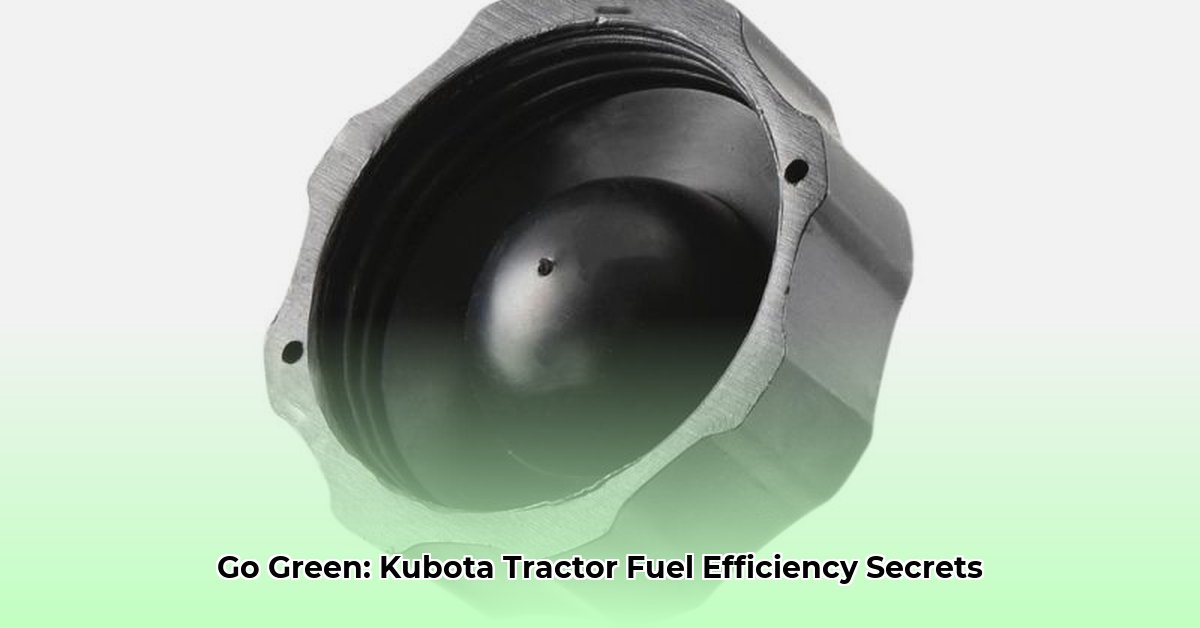
Choosing a fuel cap for your Kubota tractor might seem insignificant, but it presents an opportunity to minimize your farm's environmental impact. This guide provides actionable steps to select eco-friendly options and promote sustainable practices within the agricultural sector. Learn more about Kubota's commitment to sustainability by visiting their regeneration process.
Understanding the Environmental Impact of Fuel Caps
Many standard fuel caps are made from virgin plastic, demanding energy-intensive production and contributing to plastic waste. These caps often end up in landfills, adding to environmental pollution. Switching to a sustainable alternative significantly reduces your farm's carbon footprint. Did you know that replacing just one plastic fuel cap can prevent approximately 0.5 lbs of plastic waste from entering landfills annually?
What Makes a Fuel Cap Eco-Friendly?
Several key factors define an eco-friendly fuel cap:
Recycled Materials: Look for caps made from recycled plastic, reducing the demand for virgin resources and promoting waste reduction. This is a simple yet impactful choice.
Bioplastics: Consider caps utilizing bioplastics, plastics derived from renewable sources like plant materials. This reduces reliance on fossil fuels for plastic production.
Certifications: Check for certifications from reputable organizations validating environmental claims. This adds a layer of transparency and ensures that the cap's sustainability claims are genuine.
Finding Your Eco-Friendly Kubota Fuel Cap: A Step-by-Step Guide
Unfortunately, comprehensive information on fuel cap sustainability is often scarce. Here’s a practical approach:
1. Contact Kubota Directly: Reach out to Kubota's customer service or sustainability department. Inquire about their environmental initiatives and the materials used in their fuel caps. They may offer insights into their manufacturing processes and sustainability goals.
2. Investigate Online Retailers: Carefully examine product descriptions when shopping online. Look for clear statements about recycled content or certifications. Compare different options and read customer reviews focusing on durability and sustainability.
3. Compare and Contrast: Don’t settle for the first option. Compare several retailers and analyze the materials, claims, and prices. Prioritize transparency and readily available information regarding sustainability.
4. Extend Your Current Cap's Life: If a sustainable replacement is unavailable immediately, extend your existing cap's lifespan. Regular cleaning and correct storage can significantly prolong its useful life.
Beyond the Fuel Cap: Expanding Sustainable Farm Practices
Choosing a greener fuel cap is a positive step, but it's just one element of a broader sustainability strategy. Consider these additional actions:
Advocate for Change: Contact Kubota and your suppliers, expressing your preference for eco-friendly options. Consumer demand significantly influences manufacturers' choices and product development.
Support Eco-Conscious Businesses: Prioritize suppliers committed to sustainability. Support businesses actively working towards environmental responsibility.
Responsible Disposal: When your fuel cap reaches its end of life, ensure it is recycled properly or disposed of according to local regulations.
Your Action Plan: A Timeline for Greener Farming
Here’s a structured approach to implementing sustainable practices:
Today: Begin researching fuel caps from various sources. Focus on claims, material composition, and certifications.
This Week: Contact Kubota and your regular suppliers. Ask for detailed information on manufacturing processes and materials used in fuel cap production.
This Month: Make an informed purchase decision, selecting a sustainable fuel cap if available. If not available, express your demand for such options.
Long-Term: Implement a regular maintenance schedule for your equipment, prolonging the lifespan of parts and reducing waste. This proactive approach minimizes overall resource consumption and supports sustainable practices.
By embracing sustainable practices, such as choosing an eco-friendly fuel cap, you not only contribute to environmental protection but also enhance your farm's long-term viability and economic resilience. Every small action towards sustainability builds a more environmentally conscious agricultural sector for the future.